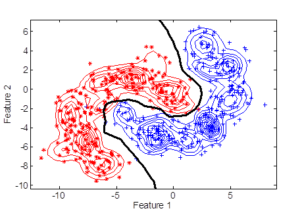How Artificial Intelligence can help to the development of diagnostics dedicated to Precision Medicine

Generating sequencing data from patient blood samples became easy to perform in clinical trials. But, analyzing the huge amount of genomic or transcriptomic data and extracting the key biomarkers associated with a clinical response to a specific therapy needs a tremendous combination of a scientific expertise, a biomolecular know-how, and a panel of bioinformatics and biostatistics tools, in which Artificial Intelligence is today one of the success factor to develop the future routine diagnostics.
Acobiom is specialized in the discovery of new biomarkers and in the development of innovative diagnostics dedicated to Precision Medicine. Acobiom’s platform combines molecular biology techniques (Sequencing/NGS, quantitative RT-PCR…) in one side, bioinformatics and biostatistics programs and algorithms combined with Artificial Intelligence tools in a second side to perform a large range of RNA/DNA analyses.
To develop routine blood diagnostics for Precision Medicine applications, Acobiom built-up a reproducible process that allows the discovery (phase 1) and the validation (phase 2) of a combination of biomarkers associated with the clinical effects of the studied therapy.

To discover a first list of putative biomarkers, the company sequences with no a priori the patient blood samples, treats and analyzes the huge amount of obtained sequencing data with the support of several bioinformatics programs and algorithms. Afterwards, each identified biomarker is integrated and tested to check the results in MaRS database, the Acobiom’s proprietary database containing more than 21,000 Human RNA-Seq profiles.
A second phase aims the validation of the selected biomarkers: Acobiom’s scientific team transfers the selected biomarkers on standard Real-Time PCR (qPCR) platform. Actually, in vitro diagnostics developed by the company are based on qPCR technology (widely used worldwide). In this validation phase, Acobiom makes an extensive usage of machine learning (one of the Artificial Intelligence component) in order to unravel the specific combination of biomarkers associated with the patient response of the studied therapy.
Acobiom’s scientific team built-up an application based on “elastic-net” regression in order to create a decision-helping tool. Its algorithms are able to associate a wide range of genomic and clinical data in order to predict the output variables (survival, class selection, quantitative biomarkers, etc.).

The company’s solution enables the computing of an integrated “Hybridomics” variable to decipher any kind of patterns associated to the clinical and genomic data. Then, Acobiom uses an optimizer which is a dynamic self-trained algorithm based on neural network approach in order to maximise the sensitivity and the specificity of the future routine diagnostics, which will enable to the identification of the different sub-populations of patients in Precision Medicine usage.
For more information about Acobiom, its developments of in vitro diagnostics, its scientific expertise and its technical know-how (genomics, transcriptomics, bioinformatics, biostatistics, artificial intelligence), please contact the company: busdev@acobiom.com

